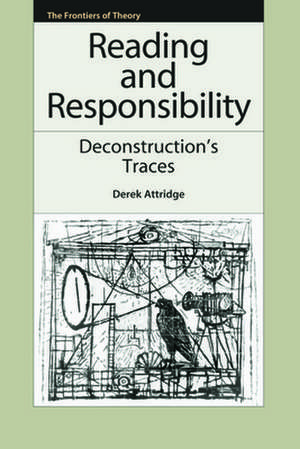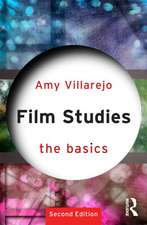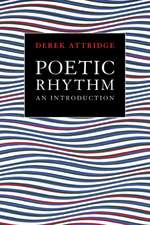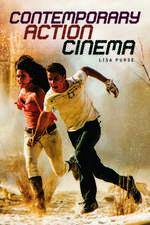Reading and Responsibility: Frontiers of Theory
Autor Derek Attridgeen Limba Engleză Hardback – 26 mai 2010 – vârsta de la 22 ani
Preț: 581.92 lei
Preț vechi: 710.23 lei
-18% Nou
Puncte Express: 873
Preț estimativ în valută:
111.35€ • 116.26$ • 92.16£
111.35€ • 116.26$ • 92.16£
Carte tipărită la comandă
Livrare economică 05-19 aprilie
Preluare comenzi: 021 569.72.76
Specificații
ISBN-13: 9780748640089
ISBN-10: 0748640088
Pagini: 192
Ilustrații: 2 black & white illustrations
Dimensiuni: 162 x 240 x 16 mm
Greutate: 0.43 kg
Ediția:New.
Editura: EDINBURGH UNIVERSITY PRESS
Seria Frontiers of Theory
Locul publicării:United Kingdom
ISBN-10: 0748640088
Pagini: 192
Ilustrații: 2 black & white illustrations
Dimensiuni: 162 x 240 x 16 mm
Greutate: 0.43 kg
Ediția:New.
Editura: EDINBURGH UNIVERSITY PRESS
Seria Frontiers of Theory
Locul publicării:United Kingdom
Notă biografică
Derek Attridge is Professor of English at the University of York and a Fellow of the British Academy. He is the author or editor of numerous books on literary theory, James Joyce, poetic form, and South African writing. Born in South Africa, he has taught in Britain, the U.S.A., France, and Italy. He edited Jacques Derrida's Acts of Literature, and his recent books include The Singularity of Literature and J. M. Coetzee and the Ethics of Reading.
Cuprins
Introduction; 1. Deconstruction Today; 2. Singularities, Responsibilities: Derrida, Deconstruction, and Literary Criticism; 3. Following Derrida; 4. The Impossibility of Ethics; 5. Arche-Jargon; 6. Deconstruction and Fiction; 7. Posthumous Infidelity: Derrida, Levinas and the Third; 8. Roland Barthes's Obtuse, Sharp Meaning and the Responsibilities of Commentary; 9. Nothing to Declare: J. Hillis Miller and Zero's Paradox; 10. The Place of Deconstruction: a dialogue with Jean-Michel Rabate; 11. Coetzee's Artists, Coetzee's Art.
Recenzii
This wonderful book admirably displays Derek Attridge's special gifts as a reader: clarity, learning, and penetrating understanding. It contains some of the best essays ever written about what is distinctive in Derrida's thinking. -- J. Hillis Miller, UCI Distinguished Research Professor of Comparative Literature and English, University of California at Irvine Over the past forty years, Derek Attridge has engaged, quite possibly more meticulously than anyone else, the work and thought of Jacques Derrida. In this book, he presents us with many of the richest fruits of that work of love. Through his abiding care for the working of language, he reminds us just how exacting, how adventurous, how serious and how deeply responsive Derrida could be to the words and potential meanings of others. That generosity, that hospitality, is something that Attridge himself now advances; and, by bringing Derrida into an encounter with thinkers and writers from the Renaissance to the contemporary world, he is able to make us feel the power and importance -- the profound responsibility -- of an attending to the words of others: it is, and becomes here, a matter of life and death, be it the life and death faced by Abraham and Isaac, the life and death of Derrida himself and of his friends, such as Levinas, or the life and death of cats at the mercy of humans. The stakes are always high; the writing always lucid; the demands of literature always exigent -- and this is what Attridge knows, and allows us to feel. In these crude and barbaric times, we are fortunate to be made aware, once again, of the importance of responsibility in our human encounters with others, with the world. -- Thomas Docherty, Professor of English and of Comparative Literature, University of Warwick This wonderful book admirably displays Derek Attridge's special gifts as a reader: clarity, learning, and penetrating understanding. It contains some of the best essays ever written about what is distinctive in Derrida's thinking. Over the past forty years, Derek Attridge has engaged, quite possibly more meticulously than anyone else, the work and thought of Jacques Derrida. In this book, he presents us with many of the richest fruits of that work of love. Through his abiding care for the working of language, he reminds us just how exacting, how adventurous, how serious and how deeply responsive Derrida could be to the words and potential meanings of others. That generosity, that hospitality, is something that Attridge himself now advances; and, by bringing Derrida into an encounter with thinkers and writers from the Renaissance to the contemporary world, he is able to make us feel the power and importance -- the profound responsibility -- of an attending to the words of others: it is, and becomes here, a matter of life and death, be it the life and death faced by Abraham and Isaac, the life and death of Derrida himself and of his friends, such as Levinas, or the life and death of cats at the mercy of humans. The stakes are always high; the writing always lucid; the demands of literature always exigent -- and this is what Attridge knows, and allows us to feel. In these crude and barbaric times, we are fortunate to be made aware, once again, of the importance of responsibility in our human encounters with others, with the world.

























